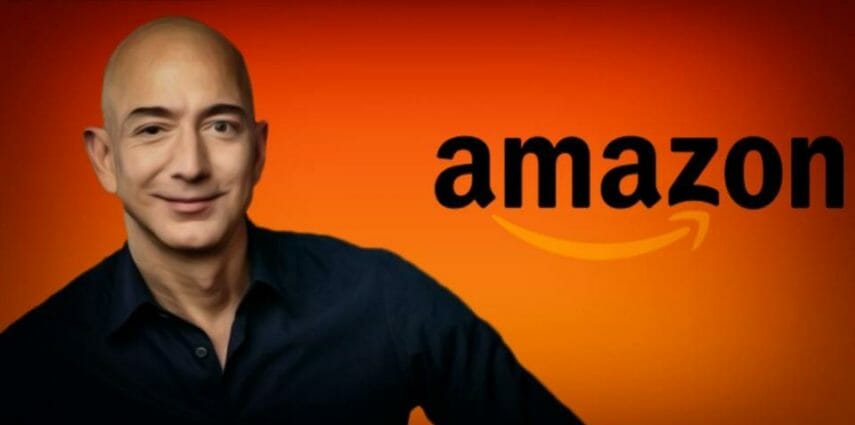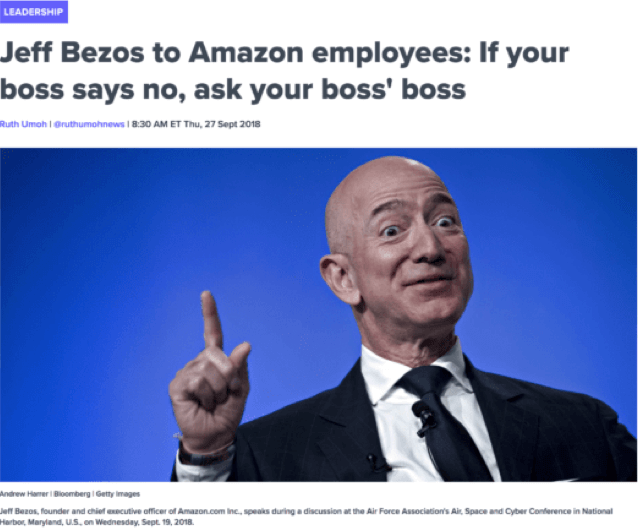This isn’t just theory, but practical insights. Since founding Amazon in 1994, Jeff Bezos has run his company according to an unconventional set of core principles:
- don’t worry about competitors,
- don’t worry about making money for shareholders, and
- don’t worry about the short-term.
- Focus on the customers, and everything else will fall into place.
CB Insights celebrated Amazon’s 21stbirthday, publishing 21 lessons learned from Jeff Bezos’ annual letters to Amazon’s Shareholders. Those letters reflect Bezos’ vision, not only for his own company but the future of commerce.
I’ve included many quotes taken directly from the letters themselves. The summary of these letters gives you a glimpse into the man’s thinking and approach. But as they say – it’s easier said than done. It’s not impossible though. Whether we run our own company, or working at someone else’s, or even in our personal lives, we can find ways to implement these lessons to improve our lives.
Fear your customer
Every decision that gets made at Amazon gets made through “the context of the customer experience.”
“I constantly remind our employees to be afraid, to wake up every morning terrified. Not of our competition, but of our customers. Our customers have made our business what it is, they are the ones with whom we have a relationship, and they are the ones to whom we owe a great obligation. And we consider them to be loyal to us— right up until the second that someone else offers them a better service.”
If you don’t do everything in your power to align with customers’ shifting needs, and instead allow yourself to be distracted by competitors, you’ll quickly lose them. Keeping our customer experience at every part of their journey, is our only way forward.
’Working backward from customer needs can be contrasted with a ‘skills-forward’ approach where existing skills and competencies are used to drive business opportunities. The skills-forward approach says, ‘We are really good at X. What else can we do with X?’ That’s a useful and rewarding business approach. However, if used exclusively, the company employing it will never be driven to develop fresh skills.”
“Even our pricing strategy does not attempt to maximize margin percentages,” Bezos writes, “but instead seeks to drive maximum value for customers and thereby create a much larger bottom line.”
Fear stagnation
Day 2 is stasis. Followed by irrelevance. Followed by excruciating, painful decline. Followed by death. And that is why it is always Day 1.”
Day 1 represents originality, enthusiasm, and an eagerness to delight customers.
Day 2, for Bezos, is a powerful concept that embodies everything he fears could happen to Amazon and that does happen to many large organizations.
Day 2 is the failure to adapt. And the bigger an organization gets, the harder it needs to work to stave off complacency.
Bezos offers four strategies to fight complacency:
- Stay focused on the customer and the customer experience
- Be skeptical of proxies
- Stay alert for and quickly adopt trends
- Make high-quality, high-velocity decisions
I’d like to highlight one of the ways Amazon fights stagnation: “You can’t expect to progress technologically if you’re siloing your company’s technology work in some kind of R&D department”, Bezos writes. “At Amazon, technology pervades everything— every process, every decision, and every [one of our] businesses.”
Focus on cash flow
“Though some may find it counterintuitive, a company can actually impair shareholder value in certain circumstances by growing earnings. This happens when the capital investments required for growth exceed the present value of the cash flow derived from those investments.”
Prioritizing free cash flow will allow you to experiment and innovate quickly, as capital won’t be tied up in investments that could be irrelevant by the time they’re paid off. In today’s fast-moving business environment, this is essential to keep from falling behind. Structuring your business to prioritize free cash flow will look different from industry to industry, but Amazon does it in a few key ways:
- The company turns over inventory quickly
- It collects payments from customers before payments to suppliers are due
- It minimizes its investment in its own inventory
“Why focus on cash flows? Because a share of stock is a share of a company’s future cash flows, and, as a result, cash flows, more than any other single variable, seem to do the best job of explaining a company’s stock price over the long term.”
Focusing on free cash flow or otherwise giving your business some form of cash moat (whether through outside equity, debt stakes, or tight operations) will help ride out difficult times when customers aren’t buying and/or financing has dried up.
Capitalise on trends
Trends like AI and machine learning are big today and will be bigger tomorrow. While it’s not always easy to incorporate these kinds of trends into the work that you do, avoiding them means fighting that future. Amazon has responded to emerging trends in part through acquisitions, and in part through its’ own development and internal innovation.
Forget your competition
Building a great customer-centric business over the long-term doesn’t happen when you’re only reacting to your competitors. Proactively delighting your users costs money, but it pays off when you distinguish yourself — your customers stick around for longer and they pay you more.
“When we’re at our best, we don’t wait for external pressures. We are internally driven to improve our services, adding benefits and features, before we have to. We lower prices and increase value for customers before we have to. We invent before we have to.”
Build a strong company culture
As successful as Bezos is, one man can’t do it all. One man can have a vision, but to implement that vision, the leader needs help from others. Others who share the vision and the values of the visionary. To facilitate the successful and sustainable growth of Amazon, Bezos managed to instill a company culture, which includes the following core elements:
“To achieve high standards yourself or as part of a team, you need to form and proactively communicate realistic beliefs about how hard something is going to be”
- Maintain High-Standards: companies need to ensure that standards internally don’t stagnate, but constantly rise, along with customer’s expectations.
- Be nimble– empower people to make decisions quickly. Some decisions have irreversible, or near-irreversible consequences. Most don’t. Don’t deliberate too much. If it makes sense, with the amount of information you have on hand – just do it!
- Embrace Risk– “I believe we are the best place in the world to fail,” he writes, “and failure and invention are inseparable twins. To invent you have to experiment, and if you know in advance that it’s going to work, it’s not an experiment.” sobre esto
- Ideas are welcome– “Top-down teams are effective at optimizing existing processes and enforcing the completion of work, but only decentralized, bottom-up teams can consistently generate new ideas.”
Think Long Term
Many opportunities with fantastic upside won’t make sense in the short-term. To identify these, you have to think about what makes the most sense for your customers. When trying to weigh personal instincts versus quantitative models, use the customer experience to tip the scales.
If you want to build a successful company for the long term, build a company of owners. With the mentality of a service provider, you will likely to seek short-term gains and sacrifice future growth. Investors’ short-term focus also tends to infect the people who run companies.
With the mentality of an owner, you will always act in the best interests of your customers and your team. In the end, the work you do acting as an owner will coincide with the interests of your shareholders.
Conclusion
This week, Sears – one of the most well-known and prominent retailers in the world – have filed for bankruptcy. It’s hardly surprising to anyone who’s been watching the retail space in recent years. Since 2015, 57 large retailers have collapsed. In Australia, the land of bargain hunters, even The Reject Shop – bargain-hunters’ heaven, is seriously struggling.
Amazon, however, is not the only reason that physical retail is troubled —mounting debt and retailers’ own missteps and lack of adaptability are also to blame, among other factors as mentioned in the above lessons.
I sincerely hope that you can apply one or more of these lessons in your own work / private life… But if you think that improving the company you work for will only make shareholders and top executives richer, I’d like you to consider this view, and maybe reframe your thinking.
Look around you – all these people working with you rely on their jobs to provide for their families. If the company you’re working for now collapses, the effect of the livelihood of these people and their families will be devastating. If you can, help your company thrive. All these people around you will be better off because of it!


